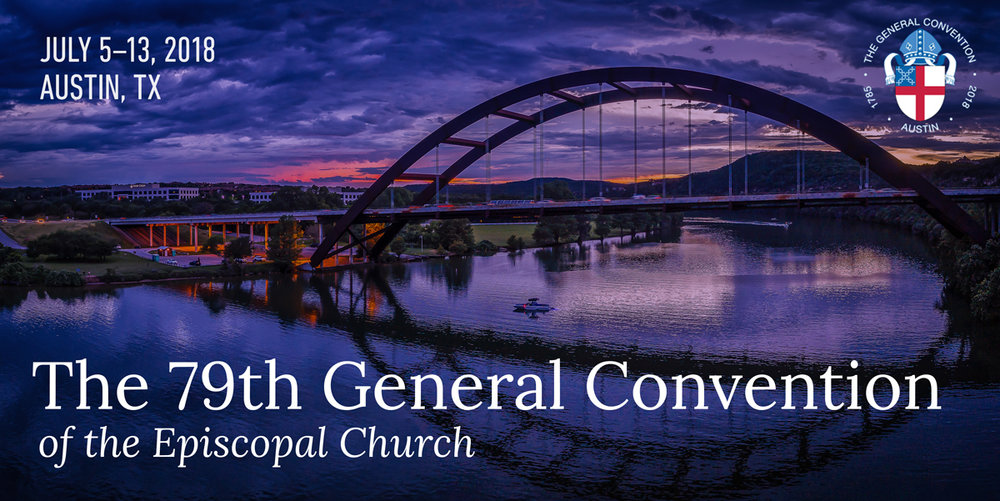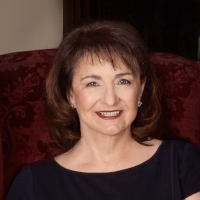
The 79th General Convention of the Episcopal Church
July 5-13, 2018, Austin, Texas
I get excited and energized during the buildup to General Convention and then going where Episcopalians from 109 dioceses that are in 17 countries worship, work, discuss issues and are together. It is the same for me for our Annual Council, which I hope that those of you who are elected to go feel, and for Province IV Synod meetings. We are a hierarchical denomination, as opposed to congregational, so this structure and polity is important to all of us because it affects the ways that we worship and live out our life together.
Schedule
July 3: Registration and committee meetings will begin
July 4: Addresses by Presiding Bishop Michael Curry and the Rev. Gay Clark Jenkins, president of the House of Deputies.
July 5: The first legislative day
July 13: Adjournment
Where did General Conventions come from?
It was established in our original constitution, which was written in 1789. It has grown to be the largest bicameral legislative body in the world.
The Most Reverend Michael Curry, our presiding bishop, leads the House of Bishops, and the Rev. Gay Clark Jennings is the elected leader of the House of Deputies. Between conventions, our life together is administered from our church headquarters located in New York City.
Where do proposed resolutions and canons come from?
There are four types:A, B, C, and D, which are so designated by their origin:
A: Interim bodies (standing commissions, task forces, and the Executive Council),
B: Bishops,
C: Provinces and dioceses,
D: Deputies.
What happens to them?
General Convention committees study proposed resolutions and canons, debate them, and at times modify them. Resolutions and canons come out of their assigned committees, read on the floor of the House of Deputies or the House of Bishops with either the recommendation that they be passed, failed, or modified.The debate on each one follows. At times, no debate emerges after the reading, and the vote is immediately taken.
What follows?
It goes to the other house, the one where it did not originate, and that house does the same thing.It votes to either pass, fail, or modify it. A resolution or canon has to pass both legislative bodies in the exact, word for word, format to be passed by GC, the whole body.
How do people, like you or me, become deputies?
After every General Convention, the triennial meeting cycle begins anew.
– Parishioners—that’s you and me—elect people to their vestries.
– Vestries, along with parish rectors and priests, select people to be delegates (people who represent the parish in their deliberations) to their annual councils.
– The delegates elect their diocese’s General Convention deputies (people who vote based on their knowledge and consciences): four clergy and four lay people in addition to four alternates in each order.
– Deputies work on preparatory responsibilities and then go to General Convention.
What do deputies do?
Deputies have the responsibility of attending its provinces’ meetings, called synods, which meet before General Conventions. Ours, Province IV, meets twice, once the year before and once the year of General Convention. Deputies attend the House of Deputies plenary sessions where they listen to addresses and debates, and vote. About one third of the deputies work on committees. They network and attend dinners, such as seminary ones and their diocese’s. They caucus frequently within their deputation. During the legislative days’ business break times, they can visit with one another and peruse the exhibits. There are a lot of them and they fall into two categories: ministry and marketing.
And what better networking can there be than at worship when prayers are offered, the word is heard in Bible readings and through preachers, and beautiful music is sung and heard. I find the worship superb and very meaningful.
What is the typical General Convention work day like?
Worship, legislative sessions, workshops, adjournment. Evening legislative sessions happen toward the end of General Convention as resolutions and canons come out of committees. (Sounds like our GA legislative process, doesn’t it?) Committees will meet at various times that could be from early morning to night.
What can you do?
Follow the happenings via the Virtual Binder. It is already live with a small amount of information under “Resolutions” and “Constitution and Canons”. The content will grow exponentially leading up to and during General Convention.
Pray for the deliberations that the Holy Spirit will fill the hearts, minds, and work of every deputy.
May God bless you in whatever way you contribute to our wonderful Episcopal Church.

By Angela Williamson, Lay Deputy
Your deputies to General Convention
Elected at 2016 Annual Council
Clergy
The Very Rev. Mary Demler, St. James’,
The Very Rev. Sam Candler, St. Philip’s,
The Rev. Sharon Hiers, Epiphany,
The Rev. Jeff Jackson, St. Margaret’s,
Convocation
Georgia Mountains
Mid Atlanta
East Atlanta
West Georgia
Lay
Ms. Beth King, Deputation Chair, St. Philip’s
Ms. Angela Williamson, St. Martin’s
Mr. John Andrews, Grace Calvary
Mr. Bruce Garner, All Saints
Convocation
Mid Atlanta
North Atlanta
Georgia Mountains
Mid Atlanta
Your alternates
Clergy
The Rev. Cynthia Parks, Grace
The Rev. Patricia Templeton, St. Dunstan’s
The Rev. Deacon Arthur Villarreal, Christ
Convocation
Georgia Mountains
North Atlanta
Macon
Lay
Mr. Raz Schreiber, St. Bartholomew’s
Ms. LaFawn Gilliam, St. Luke’s
Mr. Les Callahan, St. Anne’s
Convocation
East Atlanta
Mid Atlanta
North Atlanta
